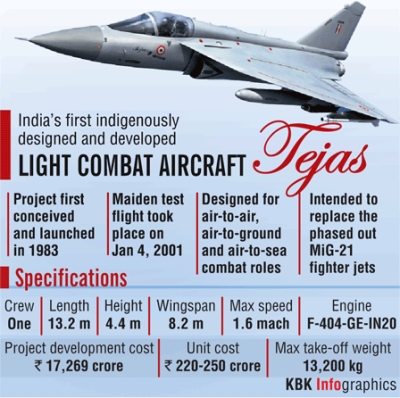What is the issue?
- The polarising debate in recent times over defence acquisitions has raised questions about indigenous defence production.
- A key proposal in this regard, is Tejas, the indigenous Light Combat Aircraft, which is getting delayed due to procedural challenges.
How is Tejas developed?
- The Tejas, or ‘radiance’, is an indigenous fighter aircraft.
- It is the smallest lightweight, multi-role, single-engine tactical fighter aircraft in the world.
- It is designed jointly by the Aeronautical Development Agency (ADA) in partnership with Hindustan Aeronautics Limited (HAL).
- This works as per the Air Staff Requirement (ASR) issued by the Indian Air Force (IAF) in 1985.
- At all stages, the IAF has wholeheartedly participated and supported in this vital indigenous design and development project.

Why is the delay in production?
- The ADA, the design authority for Tejas, incorporates design changes based on observations made during test flights.
- The ADA makes all such changes in consultation with HAL and other agencies.
- These changes are issued as “change notices” with requisite documentation and manufacturing technology.
- While the IAF participates in all these consultations, it is not authorised to issue “change notices”.
- But Tejas production is getting delayed due to the IAF changing specifications.
- HAL blames the IAF for changing specifications as the IAF is a customer and it can only issue the ASR.
- It is the HAL, as the original equipment manufacturer, which has to issue the specifications of the aircraft and its components.
- [The IAF has not changed the 1985 ASR, except for granting concessions after limitations were encountered during the design and development of the aircraft.
- So, many design changes were incorporated in the Tejas to bridge the shortfall from ASR.
- Other changes were incorporated to enhance the safety of flight, based on lessons learnt from recent accidents and incidents.]
What are the challenges?
- The production of Tejas aircraft is very different and complex because the aircraft is still at the design and development stage.
- The standard of preparation of an aircraft defines its capability, which is just evolving for Tejas.
- This requires a production capability with a robust supply chain supported by competent sub-vendors to help HAL production line to quickly adapt to such changes.
- So HAL needs to bring in institutional flexibility to quickly adapt its production line to such evolving changes during the design and development phase of Tejas or any subsequent aircraft.
- In all, the IAF and HAL have to work together for indigenous aircraft production process to be smooth.
Source: Indian Express
